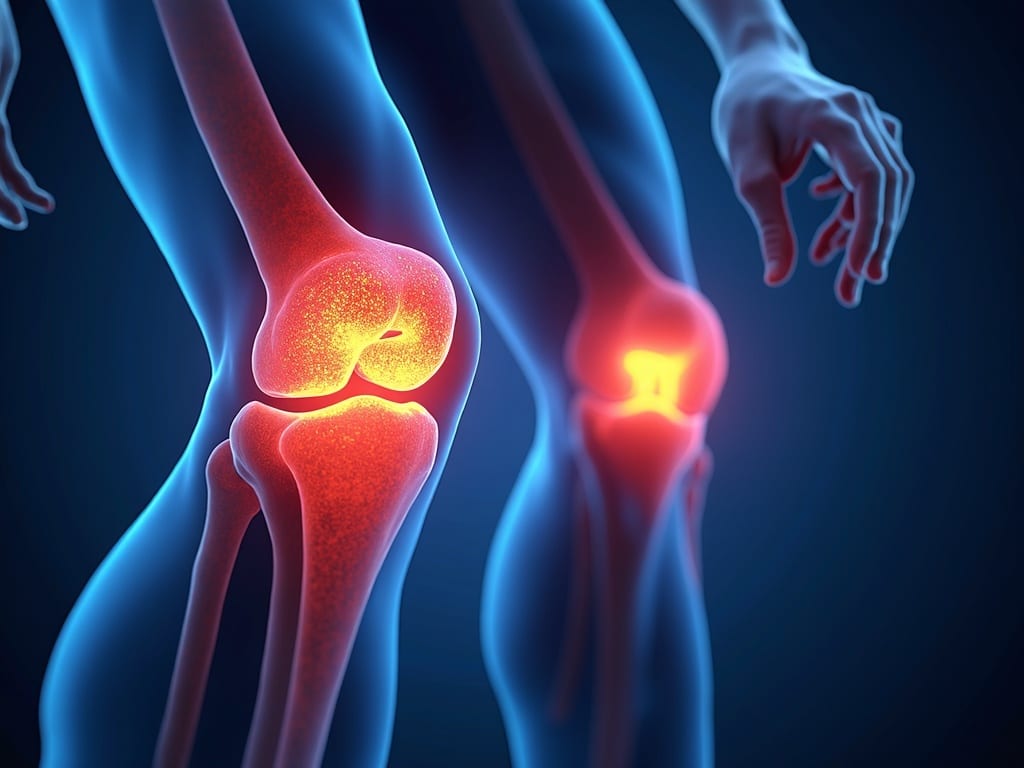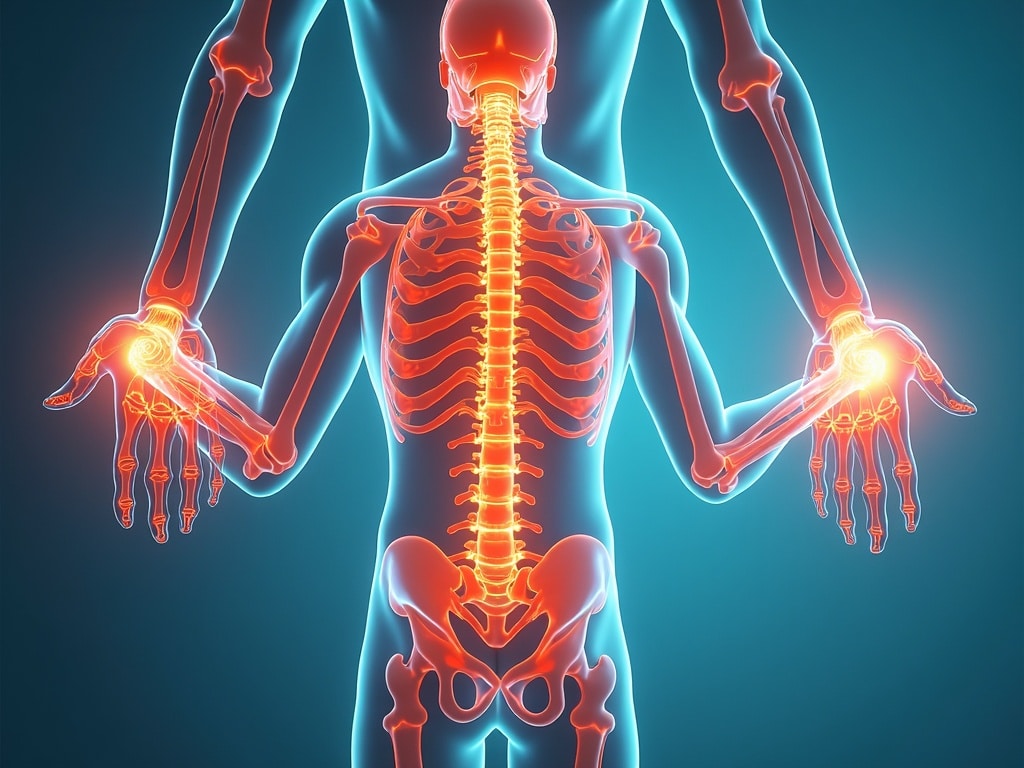Okay, I understand. Here's the HTML-formatted article based on your specifications:
Glucosamine Chondroitin with MSM: The Ultimate Joint Support Trio?
Do your joints ache with every step? Does the simple act of getting out of a chair feel like a monumental challenge? You're not alone. Millions grapple with joint pain and stiffness, searching for a solution that goes beyond temporary relief. Could the answer lie in combining three powerful compounds: glucosamine, chondroitin, and MSM? Let's delve into the science and uncover the potential benefits of this popular joint-support combination.
Understanding Joint Health and Degradation
Our joints are complex structures that allow us to move freely. Cartilage, a rubbery tissue, cushions the ends of bones within a joint, preventing them from rubbing together. This cartilage is constantly being broken down and rebuilt. However, as we age, or due to injury or certain health conditions, the breakdown process can outpace the rebuilding process, leading to cartilage loss and joint pain.
Osteoarthritis, the most common type of arthritis, is characterized by this gradual wearing away of cartilage. Symptoms can range from mild stiffness to debilitating pain, significantly impacting quality of life. While there's no cure for osteoarthritis, various treatments can help manage symptoms and slow the progression of the disease. And this is where the trio of glucosamine, chondroitin, and MSM comes in.
The Power of Glucosamine
Glucosamine is a naturally occurring compound found in cartilage. It's an amino sugar that acts as a building block for several important molecules in the body, including those responsible for cartilage formation and repair. As a supplement, glucosamine is often derived from shellfish shells or produced synthetically.
How Glucosamine Works
The primary role of glucosamine is to stimulate the production of glycosaminoglycans (GAGs), key components of cartilage. GAGs help to hold water within the cartilage matrix, providing cushioning and lubrication to the joint. By increasing GAG production, glucosamine may help to rebuild damaged cartilage and slow further degradation.
Types of Glucosamine
You'll typically find glucosamine in two forms: glucosamine sulfate and glucosamine hydrochloride (HCl). Glucosamine sulfate has been more extensively studied and some research suggests it may be more effective than glucosamine HCl. However, individual responses can vary. Look for products that specify the type of glucosamine they contain.
Chondroitin: Enhancing Cartilage Flexibility
Like glucosamine, chondroitin is a naturally occurring substance found in cartilage. It's a complex carbohydrate that helps cartilage retain water and maintain its elasticity. As a supplement, chondroitin is usually derived from animal sources, such as shark or bovine cartilage.
The Role of Chondroitin in Joint Health
Chondroitin works in several ways to support joint health. It inhibits enzymes that break down cartilage, such as matrix metalloproteinases (MMPs). It also stimulates the production of new cartilage components. Furthermore, chondroitin has anti-inflammatory properties, which can help reduce joint pain and swelling.
Chondroitin Sulfate: What to Know
Chondroitin is typically available as chondroitin sulfate. The sulfate part is crucial, as it's the form that has been most studied and shown to be effective. When choosing a chondroitin supplement, ensure it's chondroitin sulfate and look for reputable brands that test for purity and potency.
MSM: The Inflammation Fighter
Methylsulfonylmethane (MSM) is an organosulfur compound that occurs naturally in plants, animals, and humans. It's gained popularity as a supplement due to its potential anti-inflammatory and antioxidant effects. While it's not a direct building block of cartilage like glucosamine and chondroitin, it plays a crucial supporting role in joint health.
How MSM Benefits Joints
MSM's primary benefit for joints lies in its ability to reduce inflammation. It can inhibit the production of inflammatory cytokines, which are signaling molecules that contribute to pain and swelling. MSM may also help to improve the flexibility of tissues and reduce muscle spasms, further contributing to joint comfort.
MSM and Sulfur
MSM is a source of sulfur, an essential mineral that plays a role in many bodily functions, including the formation of connective tissue. Sulfur is needed for the synthesis of collagen, a key protein in cartilage, tendons, and ligaments. By providing sulfur, MSM may contribute to the maintenance and repair of these tissues.

The Synergistic Effect: Glucosamine, Chondroitin, and MSM Together
While each of these compounds offers individual benefits, the combination of glucosamine, chondroitin, and MSM is believed to provide a synergistic effect, meaning they work better together than they do alone. The idea is that glucosamine and chondroitin provide the building blocks for cartilage repair, while MSM reduces inflammation and supports overall joint health.
Research and Evidence
The research on glucosamine, chondroitin, and MSM for joint pain is mixed. Some studies have shown significant benefits, while others have found little to no effect. It's important to note that study results can vary due to differences in study design, dosage, and the specific populations studied.
Some meta-analyses (studies that combine the results of multiple studies) have suggested that glucosamine and chondroitin can be effective for reducing pain and improving joint function, particularly in people with mild to moderate osteoarthritis. MSM has also shown promise in reducing pain and inflammation in some studies.
What the Experts Say
The Arthritis Foundation acknowledges that some people with osteoarthritis experience pain relief with glucosamine and chondroitin, but emphasizes that the evidence is not conclusive. They recommend discussing these supplements with your doctor to determine if they're right for you.
Choosing the Right Supplement
With so many glucosamine chondroitin with MSM supplements on the market, it can be challenging to choose the right one. Here are some factors to consider:
- Form: Look for glucosamine sulfate and chondroitin sulfate.
- Dosage: Follow the recommended dosage on the product label or as advised by your doctor.
- Quality: Choose reputable brands that test their products for purity and potency. Look for third-party certifications, such as NSF International or USP.
- Ingredients: Check the ingredient list for any allergens or potential interactions with other medications you're taking.
- Reviews: Read reviews from other users to get an idea of their experiences with the product.
Safety and Side Effects
Glucosamine, chondroitin, and MSM are generally considered safe for most people. However, some common side effects can include:
- Nausea
- Heartburn
- Diarrhea
- Constipation
Less common side effects may include allergic reactions, such as rash, itching, or swelling. People with shellfish allergies should be cautious when taking glucosamine derived from shellfish. MSM can sometimes cause mild stomach upset.
Important Note: Glucosamine and chondroitin may interact with certain medications, such as warfarin (a blood thinner). If you're taking any medications, it's essential to talk to your doctor before taking these supplements.
Other Strategies for Joint Health
While glucosamine chondroitin with MSM can be a valuable tool for joint health, it's not a magic bullet. A holistic approach that includes other strategies is often the most effective way to manage joint pain and improve mobility. Consider these additional steps:
- Maintain a Healthy Weight: Excess weight puts extra stress on your joints, especially your knees and hips.
- Exercise Regularly: Low-impact exercises, such as swimming, walking, and cycling, can help strengthen the muscles around your joints and improve flexibility.
- Physical Therapy: A physical therapist can teach you exercises to improve your range of motion, strength, and balance.
- Eat an Anti-Inflammatory Diet: Include plenty of fruits, vegetables, and omega-3 fatty acids in your diet.
- Consider Alternative Therapies: Acupuncture, massage, and yoga may help to relieve joint pain and improve flexibility.
The Bottom Line
Glucosamine chondroitin with MSM may offer a promising approach to supporting joint health and managing pain associated with osteoarthritis. While research results are mixed, many people report experiencing significant benefits from this combination. However, it's crucial to choose high-quality supplements, be aware of potential side effects, and talk to your doctor before starting any new supplement regimen. Remember that a holistic approach that includes lifestyle modifications and other therapies is often the most effective way to maintain healthy, pain-free joints for years to come.

